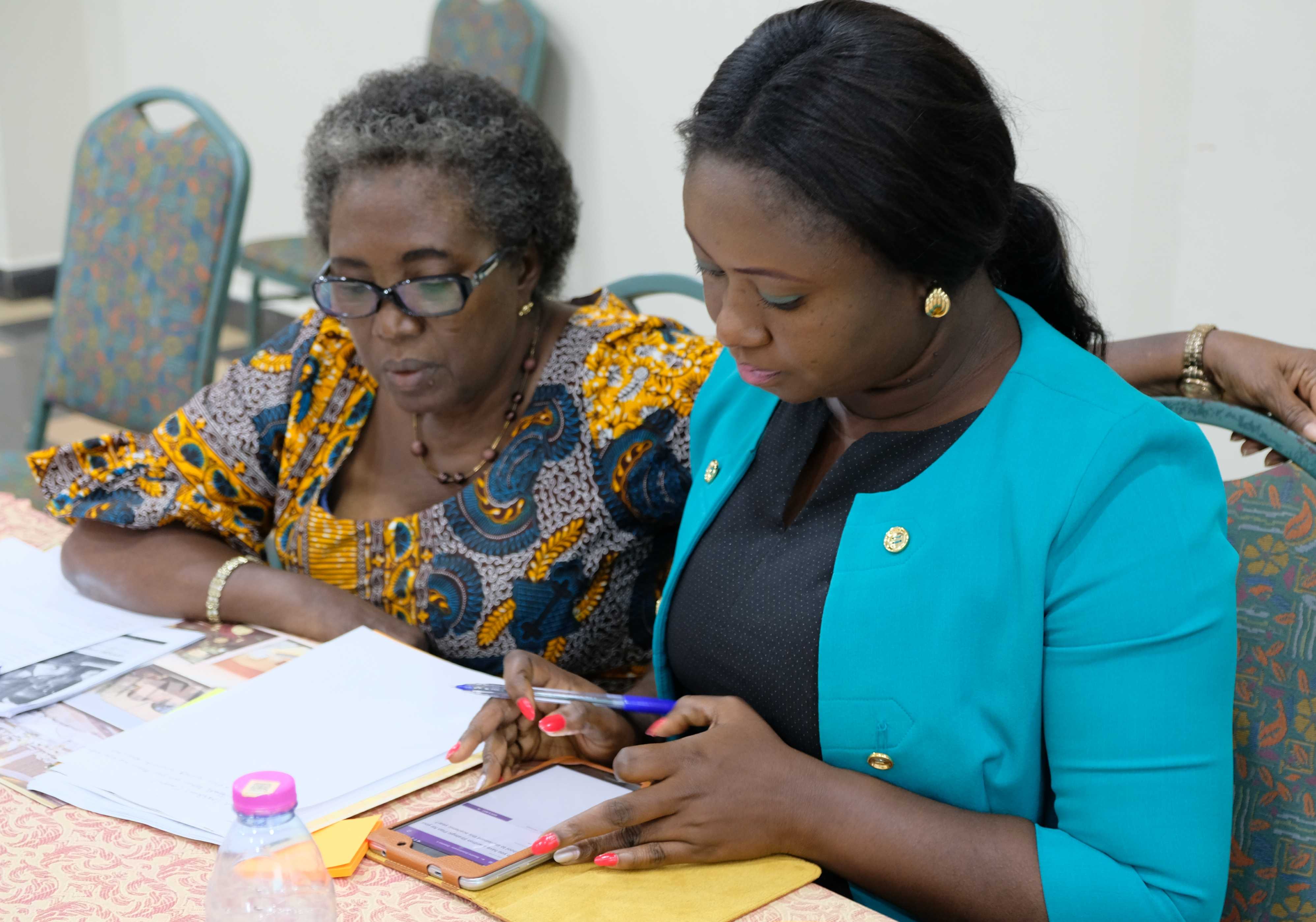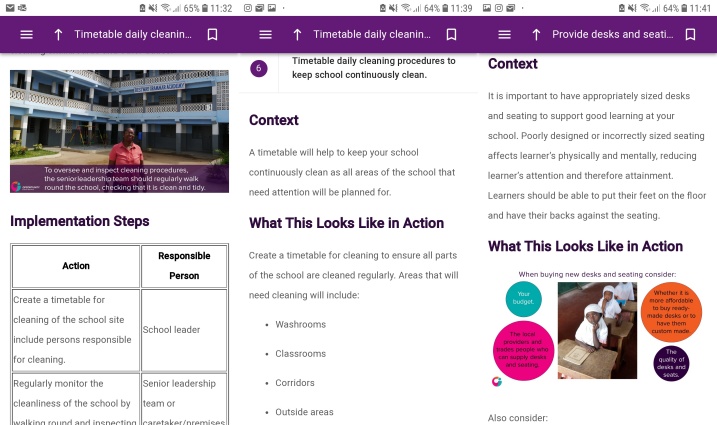EdTech: Improving Efficiency and Maintaining Quality at Scale
The EduQuality team at Opportunity International EduFinance has partnered with Chalkboard Education to launch a digital Learning Management System to deliver offline educational content, following a pilot with schools in Kumasi, Ghana. The outcomes will enable the program to scale to meet the needs of the affordable private school sector.
 Celcilia Adu-Gyamfi, Proprietress, and Jeminmmia Oforwaa Addo, Business Manager during "EduQuality Digital" Pilot in Kumasi, Ghana
Celcilia Adu-Gyamfi, Proprietress, and Jeminmmia Oforwaa Addo, Business Manager during "EduQuality Digital" Pilot in Kumasi, Ghana
Opportunity International EduFinance is partnering with the Ghana-based e-learning social enterprise, Chalkboard Education, to develop and pilot a customised learning management system (LMS) to support schools in the EduQuality program. Through collaboration with Chalkboard, the EduQuality team developed an LMS to digitally deliver the core components of the holistic school development program that serves school leaders and teachers. With off-line capability, the adapted digital content is available after a one-time download via mobile tablets. This will complement in-person trainings facilitated by a team of local Education Specialists. Through rapid cycle feedback and iteration, the “EduQuality Digital” pilot will assess user-engagement data and in-person interviews to develop a digitized delivery model that will set a strong digital foundation to scale the global EduQuality program while maintaining - and improving - the quality of services provided to educators.
“EduQuality Digital” Product Development & Pilot
Over the last 10 months, the product development team revised, digitised, and migrated Pathways to Excellence to the customised LMS platform developed by Chalkboard. P2E is a school quality measurement tool to assist school leaders assess their schools and guide them through the school development planning process.
Phase 1. Content Creation & Improvements: After collecting feedback from school leaders and the EduQuality team of Education Specialists over a 12-month period, EduQuality convened a team to analyse the feedback, identify necessary content improvements, and then update and restructure the P2E. Feedback specifically highlighted the need for more direct, simplified explanations, especially for education concepts that were new to a majority of school leaders. Other key learnings included requests for more concrete examples of policies and teaching resources, and practical action steps for transitioning to the next level of quality in a given domain.
Phase 2. Content Digitization: Through collaboration with Chalkboard Education (Chalkboard) the team began to develop the new customized Learning Management System (LMS), “EduQuality Digital,” making iterative improvements over a three-month period. Tim Maple-Foster, Product Development Associate, explained the process:
“Chalkboard showed the team a range of similar products, enabling us to see the potential functionality and design. We continually adapted the interface, layout and other media to ensure the platform was as user-friendly as possible.”
 Screenshots from the "EduQuality" platform
Screenshots from the "EduQuality" platform
Phase 3. In-Person Introduction Workshop: In July, working alongside the Chalkboard team in Ghana, EduQuality launched a 6-month pilot with 57 schools to test the new LMS. The pilot began with three days of in-person workshops in Kumasi, attended by schools new to the EduQuality program. This was to ensure they were not biased by previous exposure to P2E. School leaders were asked to attend with up to four of their school staff in order to collaborate together during the workshop. After being introduced to the EduQuality program, educators responded to a baseline survey to assess their perceptions, behaviours, and attitudes toward education quality as related to their school. Next, in small groups, these schools took the first digital P2E self-assessments using the application on tablets. From the assessment results and P2E guide to improve quality in selected priority areas, the schools then wrote and input their School Development Plans onto the digital platform.
Phase 4. School Development Plan Implementation: Schools that submitted school development plans during the workshop will now have the opportunity to continue engaging with P2E resources and action plans to begin implementation of their school development plans over the next six months. The LMS will capture user engagement data that will highlight which content is most accessed by schools. The LMS will also enable messages to be pushed to users to remind them to utilize the available resources and request updates on their school development planning implementation progress. At the end of the pilot in January 2020, pilot participants will participate in an endline assessment on education quality to measure any changes in perceptions from the baseline to endline. Renée McAlpin, Education Quality Manager, shares:
“It's our hope that the learnings and outcomes will drive improvements in our potential impact and efficiency of our intervention - while maintaining quality at scale. It's an epic game of balance and finding the right mix of programme components. We have the potential to support schools in hard to reach contexts where we have minimal or no staff. There is also massive potential to deliver school leadership and teacher mentor training through a blended in-person and digital delivery model. With the right digital foundations, we can adapt our programme to serve diverse contexts and cultures more effectively with the agility of digital content."
Expected Benefits of EduQuality going Digital
More than 9,000 schools around the world are currently borrowing from EduFinance financial institution partners. EduQuality aims to leverage technology to ensure all school leaders benefiting from EduFinance loans can also access EduQuality's support and resources to effectively improve their schools. In order to efficiently adopt learnings and ensure we are still testing relevant solutions, EduQuality has committed to designing pilots that are responsive to rapid cycle feedback and iteration. Through our partnership with Chalkboard and our customized LMS, we expect to realize five major benefits from digitizing our content:
-
More user-friendly: The functionality of the app allows for a range of media to be displayed including images, infographics, videos and audios. There are also chat, bookmarking, and progress-tracking features.
-
More content: The app stores a large volume of additional assessment and guidance content, while directing schools through logical layers to ensure they only access the specific content they need. For each domain, step-by-step instructions can be viewed explaining how to reach the next P2E assessment level, as well as practical examples and case studies from other schools.
-
Wider reach: Various school actors, from teachers to governing bodies, can access content from their mobile phones or tablet devices simultaneously at any time. This will also allow for teacher empowerment and professional development through improved digital literacy. Crucially, following the pilot stage, we hope to scale the platform to enrol more schools into the EduQuality program, accessing more hard-to-reach communities.
-
Improved data capture: The EduQuality team will be able to capture school profile, school assessment and School Development Plan data in real time and non-intrusively. Aggregating submissions will also enable us to monitor overall usability and identify areas of greatest need.
-
Back-end adaptations: By accessing the back-end of the app, the team can make continuous, real-time improvements as well as send specific notifications to users based on the feedback data.
Looking Ahead
At this pivotal point in the development of a new EduQuality blended delivery model - combining in-person training with digital school assessment tools, resources and guidance - we aim to address constraints for growth while looking ahead. Through our partnership with Chalkboard Education, a socially-focused EdTech start-up, we look forward to piloting additional self-access digital training content for both school leaders and teaching staff that can enhance in-person training delivery for greater impact on instructional leadership and foundational teaching practices. We will also continue to iterate on the “EduQuality Digital” platform by creating additional features and functionalities, adding value for the end-user based on their engagement data and feedback for the duration of the pilot.
The Importance of Innovation
According to a recent UNESCO report, without rapid acceleration from "business as normal", the world is off-target to reach Sustainable Development Goal 4 - ‘to ensure inclusive and equitable quality education for all’ by 2030. Projections based on current trends suggest that 4 in 10 young people will not complete secondary education in 2030. Progress in terms of learning outcomes has stalled due to a lack of quality teachers and broad adoption of proven effective pedagogies.
EduFinance is committed to accelerating progress towards reaching universal quality education for all by taking an evidence-driven approach to rapidly and effectively getting more children into quality schools. Rather than addressing education from a single stakeholder perspective, EduFinance’s model works to target the education ecosystem more holistically. We increase access to schooling by addressing both supply and demand constraints. Our EduFinance Technical Assistance program partners with financial institutions to provide the necessary expertise to design, launch and grow education financing products tailored for local affordable schools and parents with school-aged children. We improve school quality through the EduQuality program, which brings together local entrepreneurs from affordable private schools in a self-improving school system - a network of school clusters.
Through coordination with EduFinance financial institution partners lending to affordable private schools, the EduQuality program offers schools that opt-in to the three-year program:
- Professional development training for senior school leaders with a focus on instructional leadership and management best practices.
- Professionalization of the teacher workforce through foundational teacher training; i.e. pedagogy, teaching and learning, and classroom management.
- Guidance to each school through strategic school improvement planning with Pathways to Excellence (P2E). Each school owner first diagnoses the quality of education at their school using 42 measurable indicators of school quality and then develops a School Development Plan to improve upon areas of greatest need.